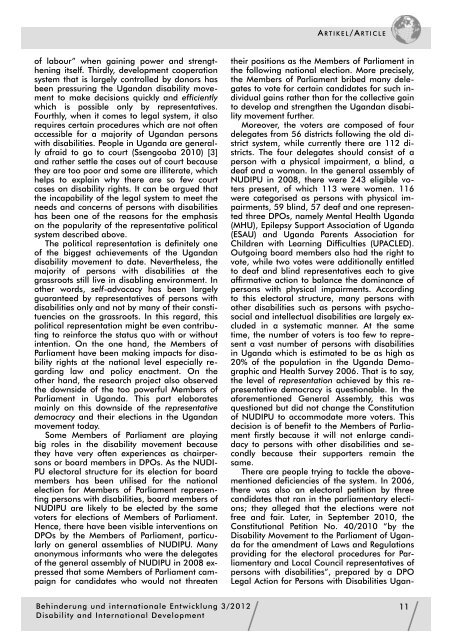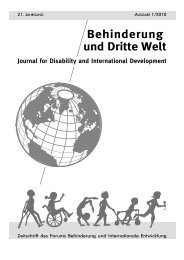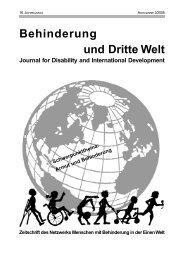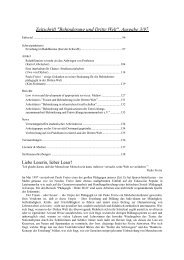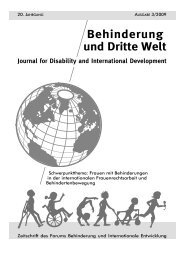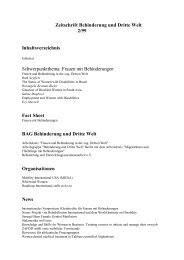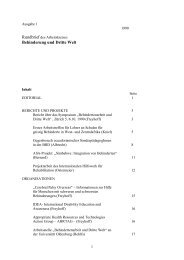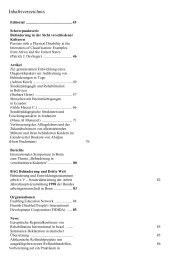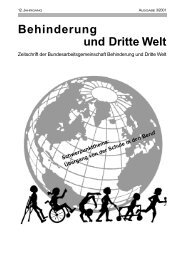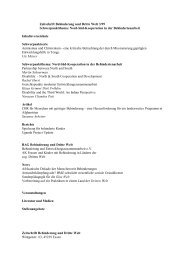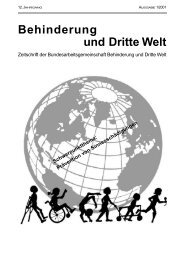Behinderung und internationale Entwicklung Disability and ...
Behinderung und internationale Entwicklung Disability and ...
Behinderung und internationale Entwicklung Disability and ...
Create successful ePaper yourself
Turn your PDF publications into a flip-book with our unique Google optimized e-Paper software.
A RTIKEL/ARTICLEof labour” when gaining power <strong>and</strong> strengtheningitself. Thirdly, development cooperationsystem that is largely controlled by donors hasbeen pressuring the Ug<strong>and</strong>an disability movementto make decisions quickly <strong>and</strong> efficientlywhich is possible only by representatives.Fourthly, when it comes to legal system, it alsorequires certain procedures which are not oftenaccessible for a majority of Ug<strong>and</strong>an personswith disabilities. People in Ug<strong>and</strong>a are generallyafraid to go to court (Ssengooba 2010) [3]<strong>and</strong> rather settle the cases out of court becausethey are too poor <strong>and</strong> some are illiterate, whichhelps to explain why there are so few courtcases on disability rights. It can be argued thatthe incapability of the legal system to meet theneeds <strong>and</strong> concerns of persons with disabilitieshas been one of the reasons for the emphasison the popularity of the representative politicalsystem described above.The political representation is definitely oneof the biggest achievements of the Ug<strong>and</strong><strong>and</strong>isability movement to date. Nevertheless, themajority of persons with disabilities at thegrassroots still live in disabling environment. Inother words, self-advocacy has been largelyguaranteed by representatives of persons withdisabilities only <strong>and</strong> not by many of their constituencieson the grassroots. In this regard, thispolitical representation might be even contributingto reinforce the status quo with or withoutintention. On the one h<strong>and</strong>, the Members ofParliament have been making impacts for disabilityrights at the national level especially regardinglaw <strong>and</strong> policy enactment. On theother h<strong>and</strong>, the research project also observedthe downside of the too powerful Members ofParliament in Ug<strong>and</strong>a. This part elaboratesmainly on this downside of the representativedemocracy <strong>and</strong> their elections in the Ug<strong>and</strong>anmovement today.Some Members of Parliament are playingbig roles in the disability movement becausethey have very often experiences as chairpersonsor board members in DPOs. As the NUDIPU electoral structure for its election for boardmembers has been utilised for the nationalelection for Members of Parliament representingpersons with disabilities, board members ofNUDIPU are likely to be elected by the samevoters for elections of Members of Parliament.Hence, there have been visible interventions onDPOs by the Members of Parliament, particularlyon general assemblies of NUDIPU. Manyanonymous informants who were the delegatesof the general assembly of NUDIPU in 2008 expressedthat some Members of Parliament campaignfor c<strong>and</strong>idates who would not threatentheir positions as the Members of Parliament inthe following national election. More precisely,the Members of Parliament bribed many delegatesto vote for certain c<strong>and</strong>idates for such individualgains rather than for the collective gainto develop <strong>and</strong> strengthen the Ug<strong>and</strong>an disabilitymovement further.Moreover, the voters are composed of fourdelegates from 56 districts following the old districtsystem, while currently there are 112 districts.The four delegates should consist of aperson with a physical impairment, a blind, adeaf <strong>and</strong> a woman. In the general assembly ofNUDIPU in 2008, there were 243 eligible voterspresent, of which 113 were women. 116were categorised as persons with physical impairments,59 blind, 57 deaf <strong>and</strong> one representedthree DPOs, namely Mental Health Ug<strong>and</strong>a(MHU), Epilepsy Support Association of Ug<strong>and</strong>a(ESAU) <strong>and</strong> Ug<strong>and</strong>a Parents Association forChildren with Learning Difficulties (UPACLED).Outgoing board members also had the right tovote, while two votes were additionally entitledto deaf <strong>and</strong> blind representatives each to giveaffirmative action to balance the dominance ofpersons with physical impairments. Accordingto this electoral structure, many persons withother disabilities such as persons with psychosocial<strong>and</strong> intellectual disabilities are largely excludedin a systematic manner. At the sametime, the number of voters is too few to representa vast number of persons with disabilitiesin Ug<strong>and</strong>a which is estimated to be as high as20% of the population in the Ug<strong>and</strong>a Demographic<strong>and</strong> Health Survey 2006. That is to say,the level of representation achieved by this representativedemocracy is questionable. In theaforementioned General Assembly, this wasquestioned but did not change the Constitutionof NUDIPU to accommodate more voters. Thisdecision is of benefit to the Members of Parliamentfirstly because it will not enlarge c<strong>and</strong>idacyto persons with other disabilities <strong>and</strong> secondlybecause their supporters remain thesame.There are people trying to tackle the abovementioneddeficiencies of the system. In 2006,there was also an electoral petition by threec<strong>and</strong>idates that ran in the parliamentary elections;they alleged that the elections were notfree <strong>and</strong> fair. Later, in September 2010, theConstitutional Petition No. 40/2010 “by the<strong>Disability</strong> Movement to the Parliament of Ug<strong>and</strong>afor the amendment of Laws <strong>and</strong> Regulationsproviding for the electoral procedures for Parliamentary<strong>and</strong> Local Council representatives ofpersons with disabilities”, prepared by a DPOLegal Action for Persons with Disabilities Ugan-<strong>Behinderung</strong> <strong>und</strong> <strong>internationale</strong> <strong>Entwicklung</strong> 3/2012<strong>Disability</strong> <strong>and</strong> International Development11


